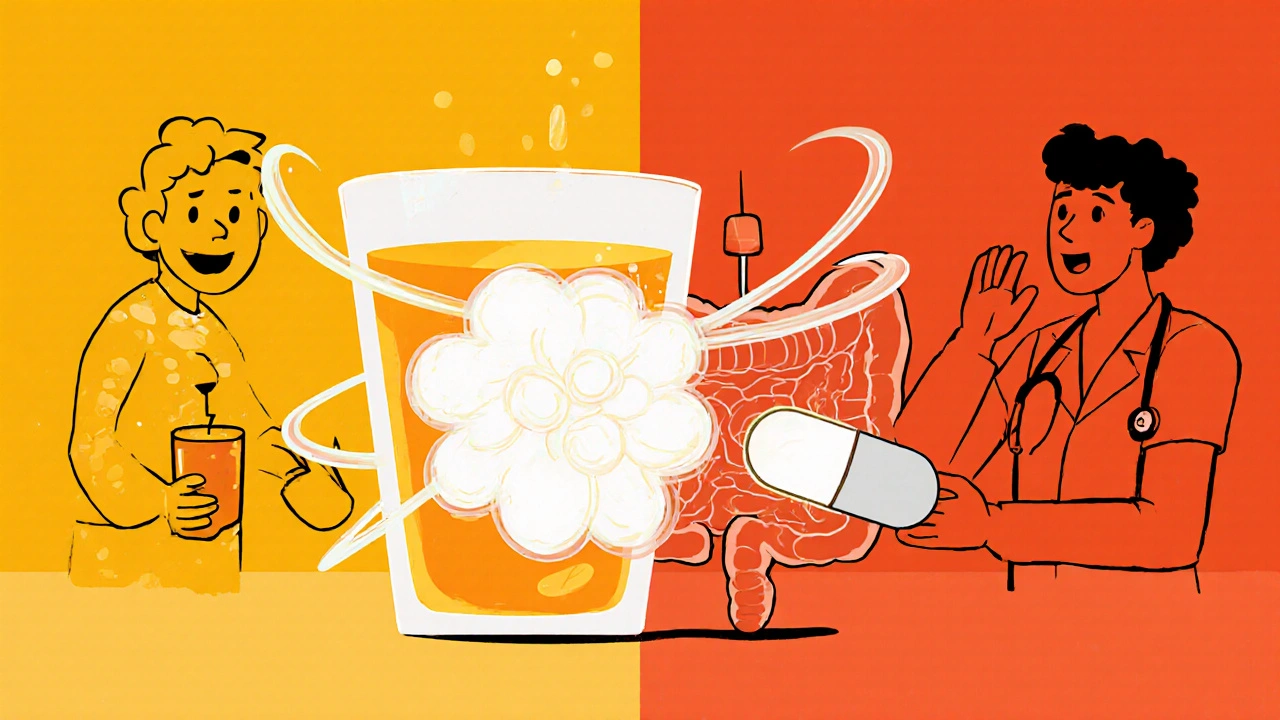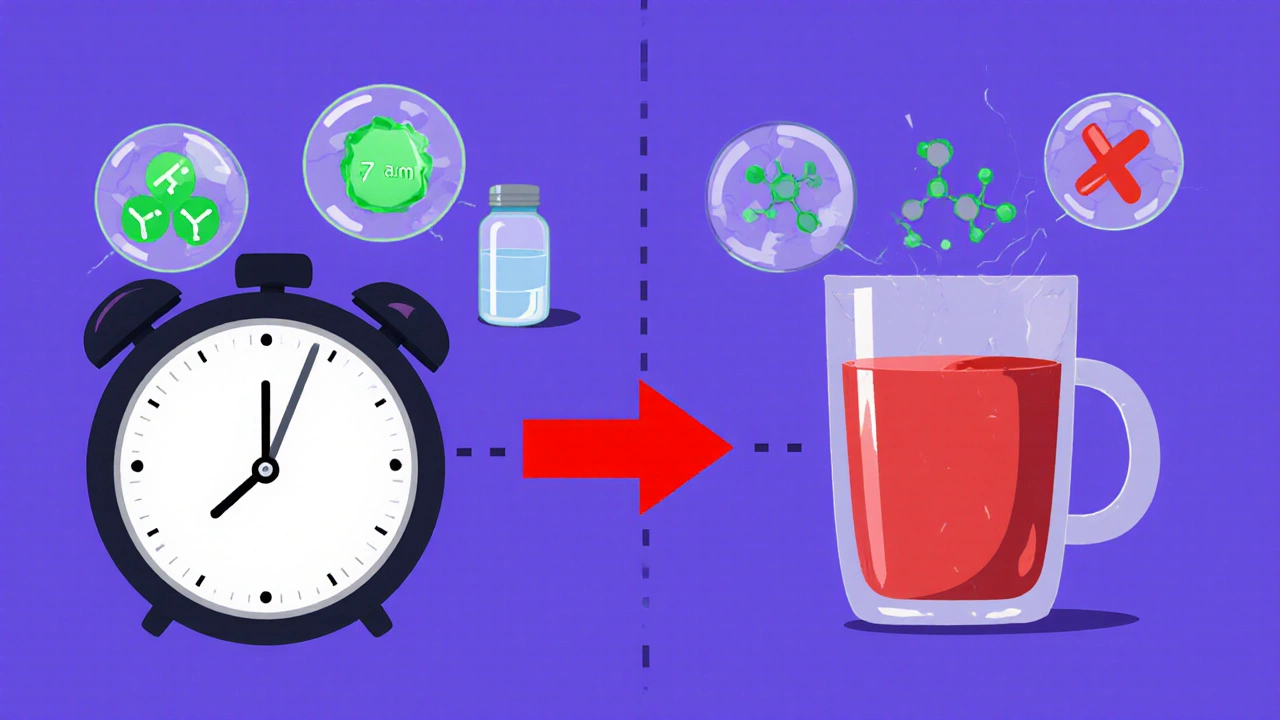
Medication & Calcium Interaction Checker
Check Your Medication
Select your medication to see if calcium-fortified beverages interfere with absorption.
Many people drink calcium-fortified orange juice to get more calcium without dairy. It’s convenient, tastes good, and seems like a smart health choice-especially if you’re lactose intolerant. But here’s the problem: calcium-fortified juice can seriously mess with how your medications work. And most people have no idea.
How Calcium Blocks Medication Absorption
Calcium in fortified juices doesn’t just sit there. When it hits your stomach and intestines, it binds tightly to certain drugs, forming big, insoluble clumps your body can’t absorb. Think of it like glue sticking to a key-now the key can’t turn in the lock. This isn’t a minor issue. Studies show calcium concentrations as low as 300 mg per serving-common in one 8-ounce glass of fortified juice-can cut drug absorption by up to 80%.This happens because calcium ions form chelate complexes with drug molecules. These complexes are too large to pass through the intestinal wall. So even if you take your pill correctly, it never makes it into your bloodstream where it’s supposed to work.
Medications That Don’t Play Well With Calcium Juice
Not all drugs are affected the same way. But several critical ones are highly vulnerable:- Tetracycline antibiotics (like doxycycline and minocycline): Used for acne, Lyme disease, and respiratory infections. Calcium can reduce absorption by 50-90%, leading to treatment failure.
- Fluoroquinolone antibiotics (like ciprofloxacin): Commonly prescribed for urinary tract infections. One study found that patients who drank calcium-fortified orange juice with ciprofloxacin had a 25-30% failure rate, compared to just 8-10% when they avoided it.
- Bisphosphonates (like alendronate/Fosamax): These are used to treat osteoporosis. If you take them with calcium juice, they won’t reach your bones. The result? No protection against fractures.
- Levothyroxine (Synthroid, Levoxyl): The most common thyroid hormone replacement. Calcium-fortified juice can slash absorption by 35-55%. Patients often end up with dangerously high TSH levels, requiring dose increases of 25-50 mcg just to get back on track.
- Antifungals like ketoconazole: Used for fungal infections. Calcium binding can make them ineffective, leading to persistent or worsening infections.
These aren’t theoretical risks. Real patients have ended up in the hospital or with chronic conditions because they didn’t know.
The Orange Juice Problem: It’s Not Just Calcium
Here’s something most people miss: calcium-fortified orange juice is a double whammy. It’s not just the calcium. It also contains citric acid, which changes the pH in your stomach. This acidic environment can further interfere with how some drugs dissolve and get absorbed.A 2021 study compared calcium-fortified orange juice to plain calcium-fortified water. The orange juice reduced ciprofloxacin absorption by 42%. The plain version? Just 31%. That extra 11% drop? That’s the citric acid making things worse.
So even if you think “I’ll just take a different calcium juice,” it doesn’t matter. Most fortified juices-apple, grape, even some plant-based milks-are fortified with the same calcium salts and often contain natural acids. The problem isn’t the fruit. It’s the calcium.

How Long Should You Wait?
Timing matters. You can’t just take your pill and then drink juice an hour later. The window depends on the drug:- Tetracyclines: Wait at least 2-3 hours before or after drinking calcium-fortified juice.
- Bisphosphonates: Take on an empty stomach with plain water, then wait 30 minutes to 2 hours before eating or drinking anything else-including fortified juice.
- Levothyroxine: The American Thyroid Association recommends a 4-hour gap. That means if you take your pill at 7 a.m., don’t drink your calcium OJ until 11 a.m. or later.
Many patients think “I’ll just take it at night” to avoid conflict. But levothyroxine is best taken in the morning on an empty stomach. Taking it at night can disrupt sleep and isn’t as effective. The solution isn’t changing your pill time-it’s changing your juice habit.
Why Nobody Tells You This
You’d think your doctor or pharmacist would warn you. But they often don’t. A 2023 survey of 512 community pharmacists found that 73% encounter patients who regularly drink calcium-fortified juice with their meds. Yet only 28% of those patients remembered being warned about it.Why? Because the warning labels on medication bottles rarely mention fortified juices. They say “avoid dairy,” and patients assume juice is fine. A 2023 study analyzed 47 popular calcium-fortified juice products. Ninety-two percent had no warning about drug interactions on the label. The front says “High Calcium!” The back? Nothing about antibiotics or thyroid meds.
Patients are being misled by marketing. The industry promotes these juices as healthy alternatives. They don’t mention the hidden risks. And most healthcare providers don’t either-because they weren’t trained to think about it.

Real Stories, Real Consequences
On Reddit, a user wrote: “I drank two glasses of calcium OJ every morning with my doxycycline. My acne got worse. My doctor said I was noncompliant. I was following instructions-I just didn’t know juice counted.”On Drugs.com, a 45-year-old woman shared: “My doctor never mentioned calcium OJ would interfere with my Synthroid. I was drinking two glasses daily with my morning pill for six months before my TSH levels finally got checked-and they were sky-high.”
These aren’t rare cases. The Institute for Safe Medication Practices logged 147 reported incidents of therapeutic failure linked to calcium-fortified beverages in just two years. That’s a 37% increase from the prior period.
What You Should Do
If you take any of the medications listed above, here’s what to do:- Check your medication’s prescribing information. Look for warnings about calcium, dairy, or antacids.
- Read the label on your juice. If it says “fortified with calcium,” assume it’s a problem.
- Separate your medication and juice by the recommended time (2-4 hours).
- Use plain water to take your pills. Not milk, not tea, not juice.
- Ask your pharmacist: “Does my medication interact with calcium-fortified drinks?” Don’t assume they’ll bring it up.
And if you’re trying to boost your calcium intake? There are safer ways. Leafy greens, canned salmon with bones, almonds, and fortified tofu are good options. You can even take a calcium supplement-but take it at a different time of day than your meds.
The Bigger Picture
This isn’t just about one juice. It’s about how we’re sold “healthy” products without full transparency. Calcium-fortified juices are a $1.2 billion market in the U.S. They’re marketed as a solution to nutrient gaps. But the unintended consequences? Billions in wasted healthcare spending.A 2022 analysis estimated that drug interactions with calcium-fortified beverages cost the U.S. healthcare system $417 million a year in extra visits, lab tests, hospitalizations, and failed treatments.
And here’s the kicker: 81% of people who drink these juices don’t even know they might be interfering with their medications. That’s not ignorance. That’s a system failure.
Pharmacies are starting to respond. Some are testing QR codes on medication bottles that link to food interaction guides. Researchers are developing new calcium forms that don’t bind as easily. But until those changes roll out, the burden is on you.
Next time you reach for that bottle of “High Calcium” orange juice, ask yourself: Is this helping me-or could it be hurting me?


10 Comments
They’re hiding this on purpose!! The pharmaceutical giants own the juice companies!! Look at the patents!! Calcium chelation? That’s just the cover-up-they’re pushing this to make us buy MORE drugs when the first ones ‘fail’!! I’ve seen the documents!! They even fund ‘studies’ that say it’s ‘safe’!! Wake up, sheeple!!
This is such an important post-and thank you for laying out the science so clearly. I’m a pharmacist, and I’ve had patients come in with TSH levels over 100 because they were drinking fortified OJ with Synthroid and thought, ‘It’s just juice, it’s healthy.’ The fact that labels don’t warn about this is a systemic failure. We need standardized labeling, maybe even QR codes on every bottle of fortified juice. Education starts with transparency, and right now, the industry is failing us.
Did you know the FDA has a secret database of all drug-nutrient interactions? They just don’t tell the public. I found it. It’s full of this stuff. They’re waiting for a crisis before they act. I’m not paranoid-I’m informed.
It is an egregious dereliction of duty on the part of regulatory agencies and pharmaceutical manufacturers to permit the marketing of calcium-fortified beverages without explicit, legible, and mandatory contraindications on the primary packaging. The absence of such warnings constitutes a breach of the duty of care owed to the consumer. One may not reasonably expect the layperson to possess pharmacological expertise sufficient to deduce chelation kinetics from nutritional labels. This is negligence masquerading as convenience.
So just wait 4 hours? That’s it?
They’re turning us into lab rats for Big Juice and Big Pharma. 🇺🇸💪 They want us weak so we keep buying. I don’t drink it anymore. I eat salmon and almonds. Real food. Not science experiments in a carton. 🤬
How could the medical establishment allow this to persist? It is not merely negligence-it is a moral collapse. The very people entrusted with our health are complicit in this silent poisoning. The fortified juice industry thrives on the ignorance of the masses. And we, the people, are being sacrificed on the altar of profit and convenience. This is not health. This is betrayal.
Exactly. Plain water. Wait 2-4 hours. Ask your pharmacist. Simple. Effective. Doesn’t cost a dime. This is the kind of info that saves lives-and money. Thanks for sharing.
So basically, my ‘healthy’ morning juice is a sneaky little drug saboteur? 😳 I feel like I’ve been played by a fruit. Time to swap it for a banana and a cup of black coffee. No more calcium OJ for me-too shady.
OMG I did this for YEARS with my levothyroxine and now I’m so tired all the time and my hair is falling out and my doc says I’m not taking it right but I thought juice was healthy?? I’m so mad!! They never told me!! This is so unfair!! I hate this system!!